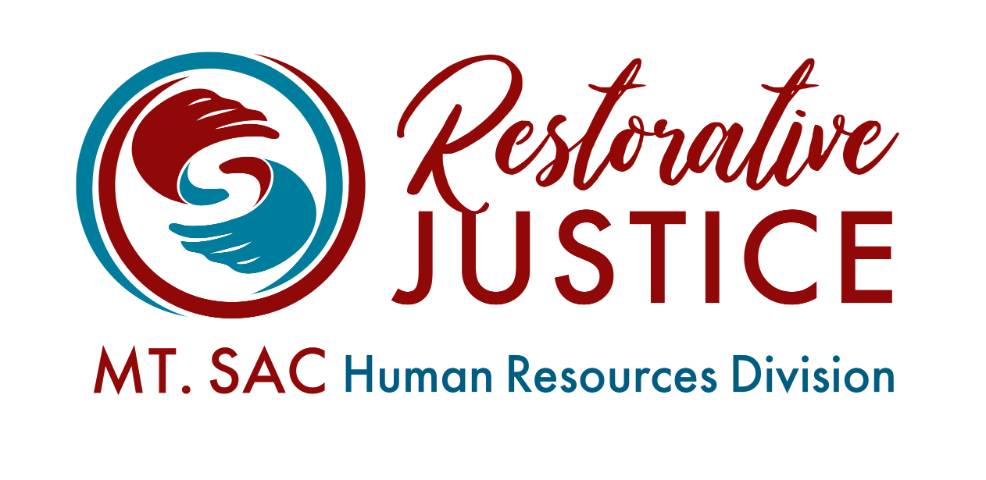
Restorative Justice Program
The Restorative Justice (RJ) program will provide access to restorative practices
and tools for employees to prevent or respond to harm in the Mt. SAC community. The
Restorative Justice program is based on the principles and practices of RJ. As a
part of the RJ program, employees (applied or nominated) to be an RJ facilitator,
were selected to facilitate the restorative practices that include community building
circles, peace conferencing, and re-entry conferences or circles. Each RJ facilitator
is trained in RJ and has a unique skillset including their diverse backgrounds, education,
professional and personal experiences, and employee group.
What is Restorative Justice?
Restorative Justice is a practice that prevents or responds to harm in a community.
In Restorative Justice terminology, "harm" is described as a violation of relationships,
ranging from personal to professional to community relationships. The emphasis of
restorative practices is on healing, social support, and active accountability. There
are a variety of practices, and the most frequently used are "Circles." Restorative
practices, many rooted in indigenous and religious traditions, are utilized to prevent
harm by building relationships & strengthening communities, responding to harm, and
supporting individuals through re-entry.
How is RJ applied in the workplace?
The RJ process will examine the harmful impact of conflict(s) in the workplace and/or
academic setting and what can be done to repair it while holding the person(s) who
caused the harm accountable for their actions. Accountability for the offender means
accepting responsibility and acting to repair the harm done. Outcomes seek to repair
the harm and address the reasons for the offense while reducing the likelihood of
re-offense. Rather than focusing on the punishment meted out, restorative justice
measures result in how successfully the harm is repaired.
Restorative Justice Circle
Restorative Practices
Restorative practices include community circles and conferences designed to give employees
an opportunity to connect with one another and gain a greater understanding of community
needs.
-
- Team and Community Building (Prevention/Relation)
Team and Community Building (Prevention/Relation) promotes restorative conversations
to address concerns within communities or work groups. The goal is to build a supportive,
intentional, and equitable community .
- Restorative Accountability Processes (Intervention/Repair)
Restorative Processes (Intervention/Repair) respond to concerns and conflict in the
form of conversational circles, restorative mediation, or group conferencing to respond
to concerns in a restorative manner. This process addresses the root causes of the
concerns, includes all impacted parties or groups, supports meaningful accountability
for individuals of concern, and promotes healing for concerns individuals, those of
concern, and the larger community.
- Re-Entry Support Circles (Individualized/Re-Integrate)
Re-Entry Support Circles (Individualized/Re-Integrate) support successful re-entry of employees due to periods of absences. The goal is to
welcome members back to the campus community in a manner that provides structured
support, and promotes teamwork and achievement for employees to ensure they are a
successful and contributing member of their workplace.
Restorative Justice Volunteer Facilitators
RJ Volunteer Facilitators (RJVFs)
In January 2024, the Restorative Justice program welcomed fifteen employees as Restorative
Justice Volunteer Facilitators (RJVFs).
-
- About
The RJVFs are employees selected from a talented and diverse applicant and nominee
pool. The RJVFs are trained to facilitate the restorative dialogue in circles or
conferences. Each RJVF brings a unique skillset, background, and varying lengths
of employment with the College. Our RJVFs are motivated and dedicated employees here
to support their peers by establishing and strengthening a community amongst employees
and navigating conflict with restorative principles.
- BIOs
Coming Soon!
- Training
The RJVFs certified as RJ facilitators, under the University of San Diego, Center
for Restorative Justice training, in January 2024.
- What are the Roles and Responsibilities of the RJVFs?
- Interest Form
If you believe you have the ability and willingness to facilitate restorative conversations
(e.g. conversational social circles and conferences), please complete the Restorative Justice Volunteer Facilitator Interest Form. Your name will be placed on a waiting list in the interim.
Time Commitment
RJ Volunteer Facilitators must be available for up to 60 hours per calendar year.
The 60 hours will include at least 24 hours of training and participating in ongoing
RJ Program meetings.
RJ circle
Restorative Justice Requests and Referrals
For more information contact Nerissa Uiagalelei, Special Project Manager, Restorative
Justice Program, HR Investigations and ADA Accommodations, at (909) 274-4414 or restorativejusticefacilitators@mtsac.edu


